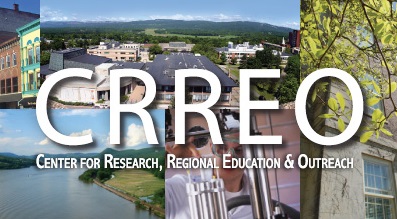CRREO releases tenth Discussion Brief, “Energy Action Consortia: Moving Municipalities Toward Collective Sustainability”
NEW PALTZ – The Center for Research, Regional Education and Outreach (CRREO) at SUNY New Paltz has released its tenth discussion brief, “Energy Action Consortia: Moving Municipalities Toward Collective Sustainability.”
The report is a case study of how the national economic crisis in 2008 produced local opportunity for a collaborative group of municipalities in Westchester County, N.Y.
From a founding membership of 12 municipalities in April 2009, the original group of collaborating towns and villages has grown into the Northern Westchester Energy Action Consortium (NWEAC), a not-for profit enrolling 18 municipalities with a combined population of more than 274,000 residents. Thanks to its achievements over the last four years, NWEAC is now recognized in Westchester County and beyond as an innovative leader in energy policy and practice, and more generally in sustainability issues.
NWEAC is proof positive that, with strong leadership and consistent local commitment, a collaborative intergovernmental infrastructure created for a particular purpose can develop into an important regional resource. As local governments face continued pressure to lower costs, the benefits of collaboration and sharing services becomes even more attractive. Replicability, a goal of NWEAC’s members from the start, while building and supporting a green and a sustainable economy, allowed the consortium to create a model that could be an example for others with the same goals across the state.
Herb Oringel, chair of the Town of Somers Energy and Environment Committee and chair of NWEAC, asserts, “The success of the NWEAC model, and the interest others have to replicate it, is attributable to the collaborative effort and encouragement of elected officials in the network of NWEAC municipalities. It still would not have been possible were it not for the skills and experiences of our dedicated leaders fueled by the common goals and objectives of delivering value to our citizens.”
A sibling consortium organized itself in 2010 as the Southern Westchester Energy Action Consortium (SWEAC), gathering 10 municipal members totaling 364,000 residents. Together, the two consortia, an alliance of local governments with a total combined population of over 639,000 in 29 municipalities, are in discussion regarding further collaboration.
Nina Orville, executive director of SWEAC and chair of the Dobbs Ferry Energy Task Force notes, “A critical question for others to consider in contemplating a consortium approach is, ‘at what scale is the effort sustainable?’ It either needs to be large enough to attract sufficient funding to be able to support necessary staff or modest enough in ambition to work well within limited existing resources.”
Leo Wiegman, mayor of the Village of Croton-on-Hudson, adds, “While the past few years of recession and tax levy caps have been tough fiscally for New York’s local governments, the benefits of pooling resources and sharing in whatever funding is available has really paid dividends for the members of our consortia here in Westchester. The process has forced us to be much more creative in establishing programs that benefit the public, while becoming either fully or partially self-funded as the programs develop.”
Gerald Benjamin, CRREO director and associate vice president for regional engagement, stated, “Research shows that local intergovernmental collaborations grow exponentially more difficult to achieve as the number of participants increases. This makes the scope and scale of the NWEAC achievement even more important.”
CRREO was established in 2007 to further engage SUNY New Paltz and its people with communities, governments, not-for-profits, and businesses across our region. CRREO conducts and publicizes research on regional topics; creates and directs select institutes focusing on specific topics of regional interest; connects and partners with local governments, not-for-profits, and businesses to initiate reforms and advocate for best practices; contracts to assess the performance of public and not-for-profit agencies and programs; and works to foster intergovernmental collaboration and community engagement.
“Energy Action Consortia: Moving Municipalities Toward Collective Sustainability” Discussion Brief is published online at www.newpaltz.edu/crreo.

